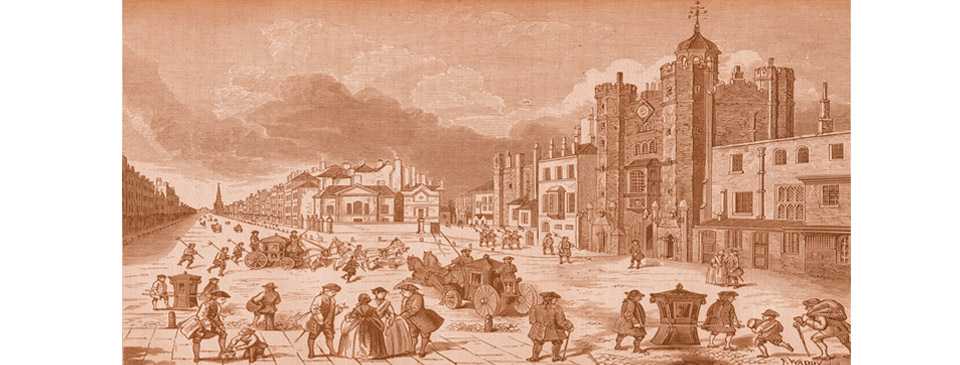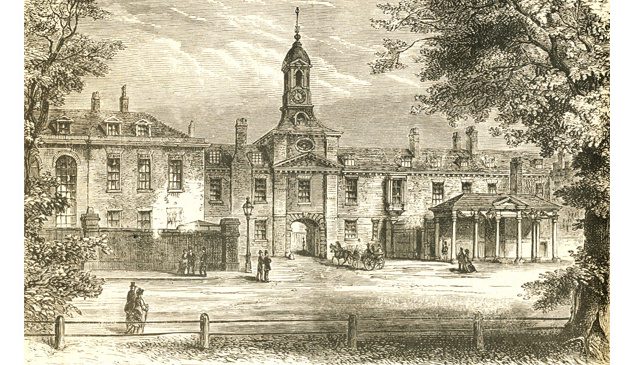In brief – Late-Stuart London

Pall Mall and St. James’s Palace at the time of Queen Anne in the early 18th century. Pall Mall was laid out along the line of where the game of ‘palle-maille’ had been played. The finest houses were on the south side overlooking St. James’s Park.
Migrants arriving in London from around Britain and Ireland often had no choice but to take casual work, finding themselves unemployed and with no financial safety net. Fewer people attended Anglican churches and social mobility resulted in many no longer constrained and supported by family and parish life. Furthermore, an ever-increasing number of people were living and working in the conurbation outside of the strict controls and regulations of the City of London. The parish-based system of law and order that had been maintained in London throughout the Middle Ages had become less effective by the 17th century. The result was that the social order of previous centuries was rapidly degenerating, especially amongst those who were not strict followers of the various forms of non-conformist Protestant faiths.
In 1690 a group of residents in Tower Hamlets, worried about “vicious Persons living in shameful Lewdness and Idleness” and the growing number of ‘bawdy houses’ (brothels) in the area formed the Society for the Reformation of Manners. Nine years later they boasted of having “purged” the east side of the City of prostitutes with as many as forty each week sent to Bridewell prison. Other societies followed, but in reality they were fighting a losing battle and crime continued to increase.
A growing proportion of the population of each parish in the London area was non-conformist. Many Anglicans were no longer attending church each week, while some Dissenter churches were so over-subscribed there was not enough room to hold the entire congregation for services.
As an alternative to the long-established classical grammar schools of St. Paul’s, Westminster, Charterhouse and Merchant Taylor’s the middle classes were by the early 18th century able to send their sons – and in some cases even daughters – to the new boarding academies located in villages around London such as Hackney and Chelsea. Academy boys learnt subjects that would be useful for them in a career in commerce while girls were taught more domestic subjects. The Five Mile Act of 1665 had driven many non-conformists out of the City of London to the outlying villages where new Dissenter schools were established. Towards the end of the 17th century the Anglican Church therefore found itself in a position of weakness in those places and new Anglican charity schools were founded. Uniforms at those schools were often blue, green or grey and the schools became known as ‘Bluecoat’, ‘Greencoat’ or ‘Greycoat’.
In such an unsanitary city as late 17th century London illness and disease was rampant and there was little chance of cure when the causes were yet to be understood. It was not through lack of effort. Members of the College of Physicians were obliged to study for up to fourteen years at either Oxford or Cambridge before being qualified to practice. Yet much of what they learnt was simply unscientific theory, passed down the centuries from the ancient Greeks. Operations were the monopoly of members of the Worshipful Company of Barber-Surgeons whose members had been required to study anatomy for seven years.
London was well-served for food. Much fresh produce was brought into the capital each day from the provinces while ships arrived in the Port of London with luxuries from far and wide. Supplies could be purchased daily from any of a number of markets. Animals and poultry were herded long distances and kept in fields on the outskirts of London where they were fattened until required for slaughter. Stalls and markets offered fresh fish, served by fishwives infamous for their crude language. Sugar was available at low prices, transported in large quantities by ship from the British Caribbean colonies, where slaves toiled in its production. Water was rarely drunk even though it was generally available by pipe in most areas. The average Londoner preferred beer of one kind or another. A number of ‘brewhouses’ produced it in and around London and improved transport meant that bottled beer could be brought from the Midlands and the north of England.


